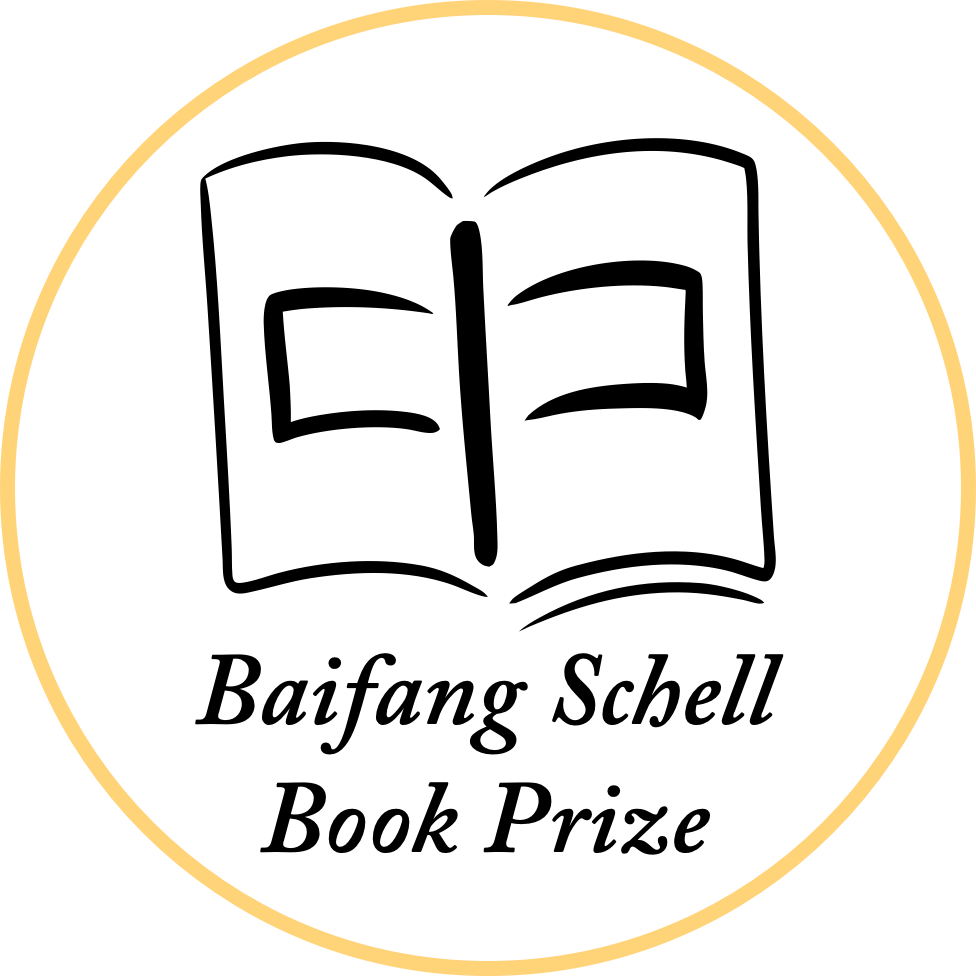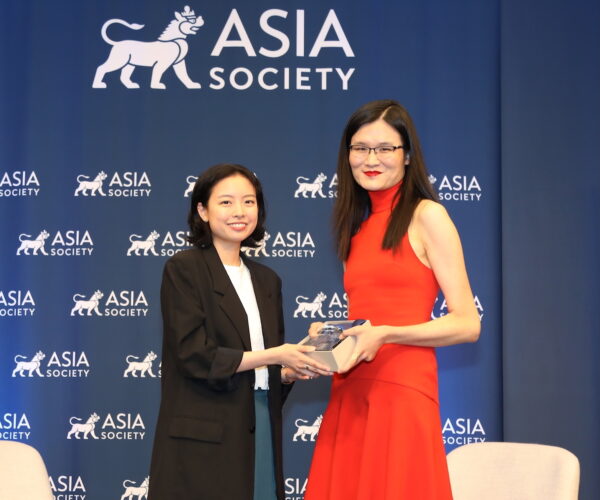Sign up for our newsletter to be notified of new posts!
The Baifang Schell Book Prize is an annual awards, started in 2024, that celebrates exceptional book-length works on or from China and the Sinophone world, published in English. The prize is administered by China Books Review, with the winners chosen by independent juries. Every early summer, an awards ceremony is held at Asia Society in New York.

There are two award categories, each accompanied by a $10,000 cash prize:
- Nonfiction (Award for Outstanding Nonfiction Book on China or the Sinophone World)
- Literature (Award for Outstanding Literature from or on China or the Sinophone World)
Each year, books published in the previous calendar year are considered by two independent juries of five respected China scholars, writers and experts. Nominations are open to the public from November to mid December, with two shortlists of five books announced the following spring, and the winners (and honorable mentions) announced a month later.

The prize is named in honor of Liu Baifang Schell, who passed in 2021 after spending her life working to advance U.S.-China relations. The purpose of the awards is to garner recognition for books that further our understanding of China and the Sinophone world, and to encourage future work.
Scroll down to see further details on: Past winners (including links to the shortlists, winners/honorable mentions, and awards ceremony video); how to nominate a book or books; and an FAQ with rule clarifications and criteria for selection.
Past Winners

2024 Awards
Nonfiction award winner:
• Edward Wong, At the Edge of Empire: A Family’s Reckoning with China (Viking, June 2024). (Jury: Andrew Nathan*, Yangyang Cheng, Barbara Demick, Isabel Hilton, Jeffrey Wasserstrom) *chair
Literature award winner:
• Yáng Shuāng-zǐ (author) and Lin King (translator), Taiwan Travelogue: A Novel (Graywolf Press, November 2024). (Jury: Eric Abrahamsen*, Xiaolu Guo, Nicky Harman, Ha Jin, Perry Link) *chair
Announcement links:
• Nonfiction shortlist (April 2025)
• Literature shortlist (April 2025)
• Winners/honorable mentions (May 2025)
• Awards ceremony (June 2025)
How to Nominate
Email info@chinabooksreview.com after reading the below.
The nomination period runs from November 1 to December 15 (midnight) every year. Nominations are open to the general public (with China experts invited in particular), subject to the following restrictions:
- Every individual in the general public can only nominate a maximum of three books across both award categories (but is not required to nominate three; one or two nominations are also welcome).
- Publishers count as individuals. Each imprint can only nominate a maximum of three books across both award categories, as nominated by their representative. If you work for a publisher, you cannot nominate books as a general public member (we will check individual affiliations).
- You cannot nominate your own book. But you can ask someone else, or your publisher, to do so.
To make a nomination between Nov 1-Dec 15 (midnight), email info@chinabooksreview with:
- The title and author of the book(s) you are nominating. (Please check the publication date of the first English language edition to ensure that it is in the current year.)
- The award (nonfiction or literature) you are nominating each book for.
- Your publishing house or imprint if you are nominating as a publisher.
Please title your email “Book prize nomination[s]” and keep it short. All nominations count equally as one nomination for that book; it does not matter what order you give them in. We will disregard any value statements about the book(s), as we only log the nomination(s) to pass onto the juries.
FAQ
Why did you start these awards?
By our count, over 600 English-language books on or from China and the Sinophone world are published every year (a combination of trade, academic and fiction books), but only a tiny fraction of these titles are covered by the press. We believe that important work deserves real reward — not only to recognize the efforts of authors, but to encourage future work in a climate where there is not enough understanding of China, at a juncture of history when that understanding is more critical than ever, especially the in-depth research and storytelling that book-length works can afford.
What books qualify for consideration?
- Only books published in the English language will be considered.
- Only books published in print by a publishing house or imprint qualify (not self-published/KDP).
- The first English-language edition of the book must be published in the calendar year under consideration (not considering any original edition, if in translation).
- For the nonfiction award: Any nonfiction book written for the general adult reader whose subject or setting is China, the Sinophone world (including Taiwan) or the Chinese diaspora. Reference books, textbooks, travel guides, recipe books and how-to guides do not qualify. Academic titles do not qualify, but books written for the general reader and published by academic presses do.
- For the literature award: Any novel, novella, story collection, graphic novel, or work of drama or poetry (published as a book) for adults whose subject or setting is China, the Sinophone world (including Taiwan) or the Chinese diaspora. Anthologies with multiple authors do not qualify. Children’s and YA books do not qualify, but fantasy/sci-fi and other genre fiction does.
- Authors employed by China Books Review or its publishers are disqualified (but not authors employed by other departments of Asia Society).
What are the criteria for selection of the winners?
The juries are fully independent, but are encouraged to reward books that carry forward the conversation on China or the Sinophone world — bringing new research, arguments or stories to light, in a compelling fashion, to further our understanding of the region in all its complexities.
The nonfiction jury is given the following broad criteria to reward in particular:
- Quality. Work that shines out for its assiduousness, ambition, clarity of thought and other measures of success, based on merit and disregarding of political stance.
- Originality. Whether through reporting, research or analysis, work that contributes something new to the conversation around greater China that has not been said before.
- Readability. Work that is easy for the general reader to follow without special prior knowledge, and whose writing and style is actively enjoyable.
The literature jury is given the following broad criteria to reward in particular:
- Story. The ability of plot, character, theme and perspective to engage the reader deeply, making them think or feel strongly.
- Style. The quality, originality and fluidity of language, as rendered into English if in translation (not considering the original).
- Substance. The skill with which themes and topics are examined (based on literary merit, not political or other viewpoint).
What is your process?
This is the order of our process as administrators of the prize:
- Shortly after the nomination period opens, we post on the site and social media calling for nominations. We also email a list of respected China scholars, writers and experts asking them to send in nominations.
- After the nomination period ends, all nominated titles are collected and sent to the juries for their information. Judges are then able to nominate further titles to add to the list for their collective consideration (but do not send in nominations as part of the general public).
- The juries consider all nominated titles to come up with a shortlist of five books (which are published on the site with blurbs from the judges, in no particular order).
- From that shortlist, the juries decide the winners and honorable mentions (which are announced on the site and in a press release, with collective praise from the jury).
- The award winners are recognized at an invite-only awards ceremony at Asia Society in New York, with two mini-panels in conversation with judges. The video of this event is then posted to the site.
How do you ensure fairness?
The jury for each award has full independence to choose the shortlist, winner and honorable mention from all qualifying books. They are instructed to disclose relationships with authors and publishers under consideration, and can recuse themselves from those discussions. The criteria of selection for the winner are based on merit alone, not background or beliefs.
How is the prize money divided?
If a book has multiple authors, the cash award is divided equally among them (with editors counting as authors for edited collections with multiple contributors). If a book is translated, the cash award is split in half between the author(s) and translator(s) — that is, two translators of a winning novel would each receive $2,500. Each winner also receives a physical award.
Who funds the prize?
The prize is funded by a grant and individual donations; it’s budget is separate to that of China Books Review.
I have another question.
For all other questions and media inquiries, please email info@chinabooksreview.com. ∎

